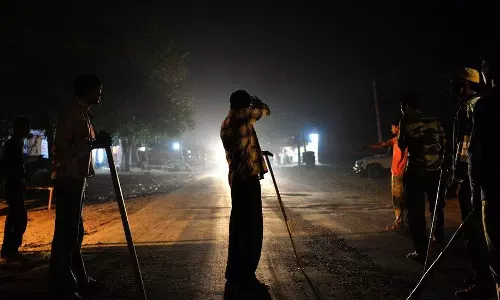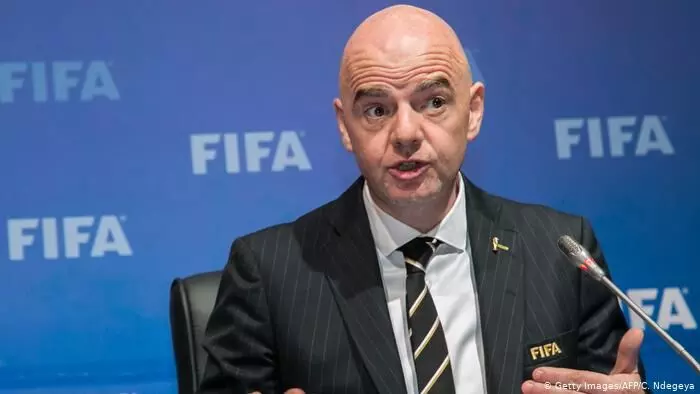
Eyeballs to move, with football
text_fieldsFootball as many say, is a beautiful group dance performed by 22 people with a ball. The world is once again zeroing in on that dance festival. 32 teams, eight stadiums, 832 players from five continents - Qatar is all set for the 22nd FIFA World Cup football tournament by overcoming all obstacles with accurate dribbling skills. The world of soccer will make its way into a new history when the official whistle blows at the Al Bait Stadium in Al-Khor, off Doha at 9:30 pm IST on Sunday. Not only is this the first time an Arab country is hosting the World Cup; the 'Qatar Fiesta' has already become a counterpoint to European supremacy in football. None of the major debates going on outside of turf are the same. Putting all that behind it, the world has moved on to the festivities of the grand sporting gala right before the clamor in the galleries. This is something visible even in the rural areas. The world is getting reduced to a global village in football to the point that the spectacular scenes are celebrated internationally. In a way, instead of saying that the world has shrunk to a football, it would be truer to say that a mere ball of a game has grown to the size of a globe.
One couldn't have put it more pithily than football legend Johan Cruyff: "The rules of football are very simple, but playing simple football is the hardest thing that there is". Time has taught us that this philosophy applies both on and off the field. When the tiny country of Qatar was awarded the World Cup venue, it became clear that this observation would also apply to the football organization. From the moment Qatar was announced as a World Cup venue in Zurich 12 years ago, they have heard criticism after criticism. In fact Qatar has had to face it more than any other country in history. Western media and some governments were outraged alike. The reproach was unusual for a World Cup to be held outside of Latin America and Europe, as South Africa too proved it in in 2010. However, this time it has become more than just criticism and hate propaganda. There was an allegation about severe human rights violations taking place in Qatar in the name of the World Cup. Newspapers including 'The Guardian' reported that 6500 workers died. In fact, this is the number of workers who died there during one Jupiter cycle. The media was thoughtlessly linking all those deaths to the World Cup! Big campaigns were also widely staged these days, raising questions like how the West would kick a ball in the scorching heat, about how the 'baby country' could hold so many people, how it could build the stadiums to the required standard, about Qatar's footballing tradition and how a religiously conscious country would reflect the multiculturalism of the World Cup.
All these questions have given way to clear answers today. The country has risen above all the hate campaigns and the weather - and stands tall. The whole world is destined for the tiny destination. Facilities that await guests may surpass anything earlier. The eight stadiums now make eight wonders; the one named '974' being worthy of a highlight. Reminiscent of the containers stacked at a sea port, the stadium was actually built from 974 containers; more significantly after the tournament they can be moved to another location. Qatar's country code is 974. Constructions like these are only possible when technology and dedication join hands. That in a way is also a creative response to hate campaigns. In fact, the organization by Qataris in general also constitutes such creativity. All this time the soccer world has been a mechanical imitation of the soccer habits and culture of FIFA and the countries that govern it. However, Qatar has endeavored to reflect as much as possible the multi-coloured values of the post-colonial world and at the same time reflect the unique culture of the host country. The official song of the World Cup, 'Hayya, Hayya', which conveys a message of unity, has been sung by people from different continents and from different cultural backgrounds.For long, football fields have been used a platform for anti-racism campaigns, but the Qatar World Cup is giving it another practical dimension. The ban on alcohol inside the field and the few restrictions on fan fests are to prevent football from getting into 'intoxicated' racial attacks. Unfortunately, the West looks prone to seeing this through the lens of xenophobia – a feature that gets often reflected in our media too. That there has been a special lobbying for that was revealed by none other than those who have descended on Qatar to roll the ball.
This is also the World Cup that Keralites watch in a venue closest to home. There are at least three lakh Malayalis in Qatar in a population of 30 lakh. A good number of them have directly or indirectly been a part of the organization of the World Cup too. That apart, even as the World Cup is closest to our country, our destiny is once again to be far away from being part of it and to continue as a people making excitement in galleries with football fever. A matter to ponder over amidst all the fanfare and celebration that another FIFA cup brings.


























